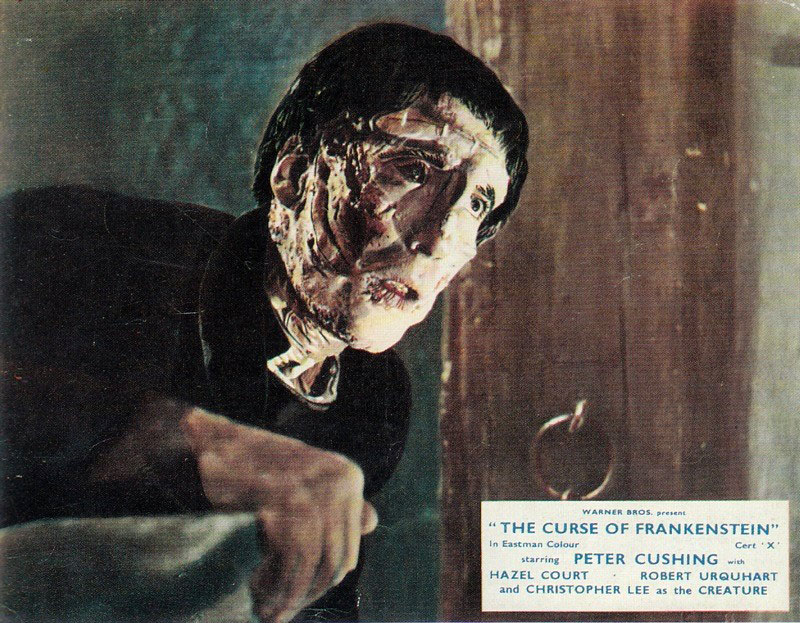RICHARD PHILLIPS-JONES celebrates the diamond jubilee of Hammer’s genre-shaping classic The Curse of Frankenstein, which opened this week in London back in 1957, and looks at its ongoing legacy.
It’s difficult at this distance to imagine the impact that The Curse Of Frankenstein had, both on audiences and on wider popular culture, back when it was originally released. The horror boom it sparked is as much a part of Britain’s cultural fabric as fish and chips, saucy humour and The Beatles.
Imagine, however that it’s 1957. The classic Universal horrors are already part of film history, still to be found in cinemas on re-releases but overtaken by a deluge of contemporary-set horrors reflecting then-current public concerns that an atomic war could kick-off at any time. In response, all manner of giant insects mutated by radiation, things invading from distant planets and creatures raised from their slumber beneath the seas were everywhere. It was into this market that Hammer scored massive success with their Quatermass adaptations, capitalising on the controversy and popularity of the earlier BBC-TV versions, not to mention the still relatively new X-certificate.
These productions (along with X – The Unknown) made sound financial sense in the current market. Reviving Gothic period horror as their next move? In costly Technicolor? This was one hell of a gamble, even on a comparatively modest budget of around £65,000 (£20,000 more than had been spent on 1955’s The Quatermass Xperiment, just to put that into context).
Even with the confidence they had in the project (and the head of Britain’s ABC cinema chain had been an encouraging voice), Hammer couldn’t have possibly imagined just how successful it would be. Opening at the Warner Theatre, Leicester Square on 2 May, box office records were smashed, and the film had to be additionally screened at the neighbouring Ritz cinema to cope with demand. Distributed in the USA by Warner Bros, it was thought to have made back 70 times its budget in takings. With global takings as well, one can only speculate on the final total. Hammer were big news in the industry, and the Hollywood studios were taking notice.

Frankenstein, in the form of Peter Cushing would be a vital lynchpin of what would become affectionately known as Hammer Horror. The key difference here was that Universal’s series was based firmly around the creature, leading to the general misconception that the name of Frankenstein applied to the creation rather than the creator. Even in the first of Hammer’s series, it is clear that the Baron is the focal point. That’s not to suggest that Christopher Lee’s affecting portrayal of the unfortunate man-made beast is a supporting turn by any stretch, but the focus in Jimmy Sangster’s screenplay is firmly on the Baron, his obsession and his ruthless machinations in the pursuit of his goal.
This first entry would set Cushing’s Frankenstein on a path which would see the Baron becoming more and more obsessed with his self-imposed mission, arguably eventually losing sight of his reasons for pursuing it in the first place. Some might say Hammer would produce better Frankenstein films as the series progressed, and there is continued debate amongst fans about what was the best. Frankenstein Must Be Destroyed (1969) is a deservingly popular choice, whilst my personal favourite is series closer Frankenstein And The Monster From Hell (1974). However, none of them can match the first entry for sheer cultural impact. Not only is it one of the key landmark horror films of all time, its place as one of the most important British films ever (regardless of genre) cannot be overstated. The aftershocks of its success would sustain our home-grown film industry for some time to come, and the resulting horror cycle continues to influence today’s film makers.
Consider the wider picture. Hollywood studios flocked to the UK through the 1960’s to make classics as disparate as Lawrence Of Arabia, The Italian Job, Far From The Madding Crowd, Get Carter and the James Bond films. They continue to use British production facilities, viewing our film technicians as some of the finest in the world. Just a few years previously, Hollywood had little interest in the UK, its films or its studios. Without Hammer demonstrating that British films could compete and prove massively successful in the US and global marketplaces, impressing the business with their streamlined in-house production methods and securing several production deals with Hollywood majors in the process, do you think any of the above would have happened? Without Hammer’s crucial decision to take that gamble, I’ll wager British film history would be very different.
So, raise your test tubes for a toast to The Curse Of Frankenstein, a film which will still be entertaining the world in another sixty years. It would seem that the Baron’s greatest discovery was eternal life…
David Saunderson (Editor, The Spooky Isles) on why he loves The Curse of Frankenstein
The Curse of Frankenstein is a perfect film in some ways. It is the beginning of Hammer’s best film series. While Dracula had some high points (the original, Brides, Prince of Darkness and Taste the Blood) it went downhill quickly. In fact, you could say Dracula bit the dust within minutes of the first film. Lee hissed his way through most of the other films. Frankenstein on the other hand was a joy to behold. Yes, some were less than others but mostly they were strong and worth watching again and again. This is because of Terence Fisher and Peter Cushing. I love The Curse of Frankenstein. Victor Franken-SHTEIN was a prick, arrogant, narrow-minded and totally obsessed with creating life in his lab. He murders people to get his way and he cares nothing for anyone but himself and his goals. Even at the end of the series, the masterful Frankenstein and the Monster from Hell sees him determined to continue after he fails. The Curse of Frankenstein set up the series perfectly. And it’s got Hazel Court in it, so I won’t hear a bad word said against it.







